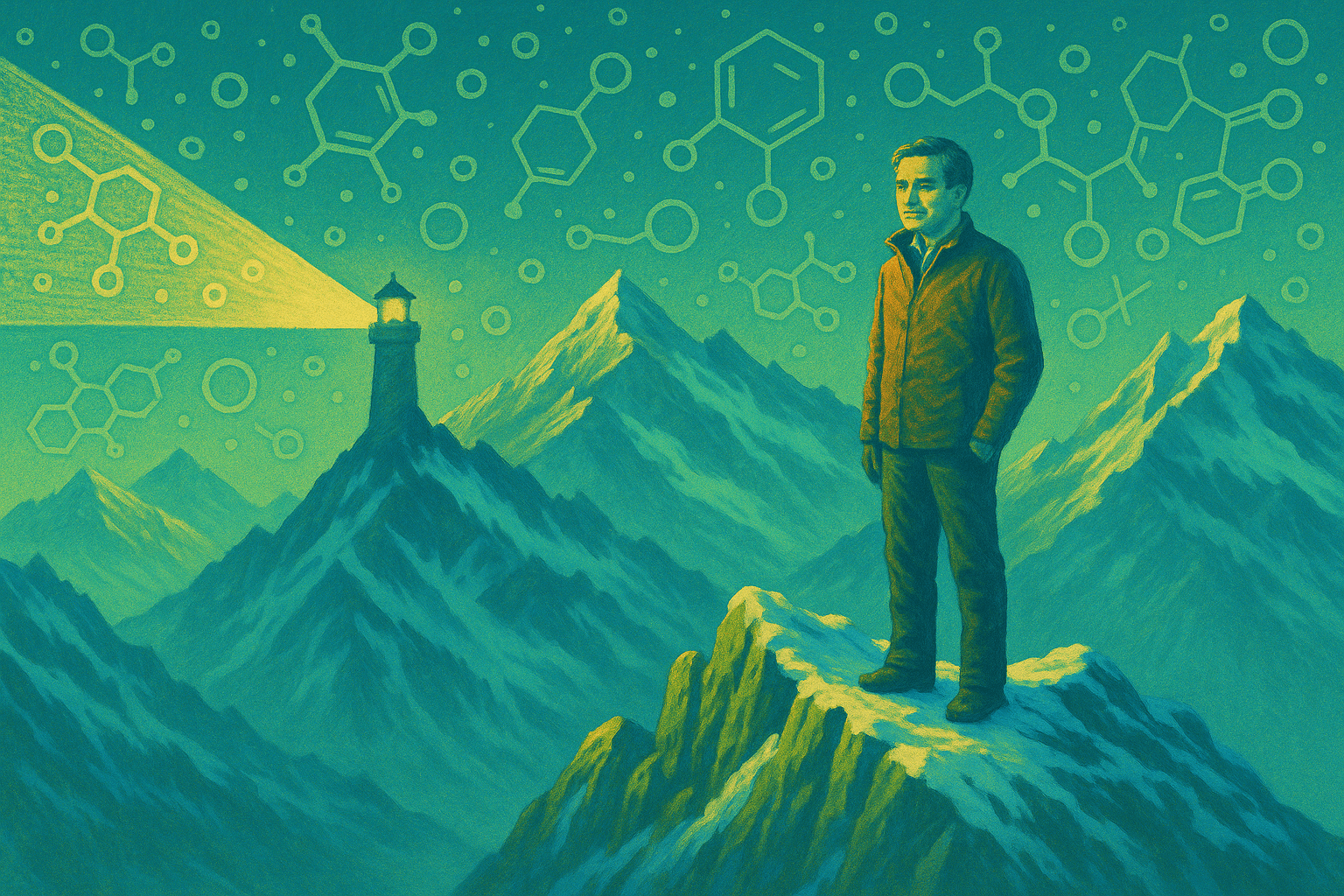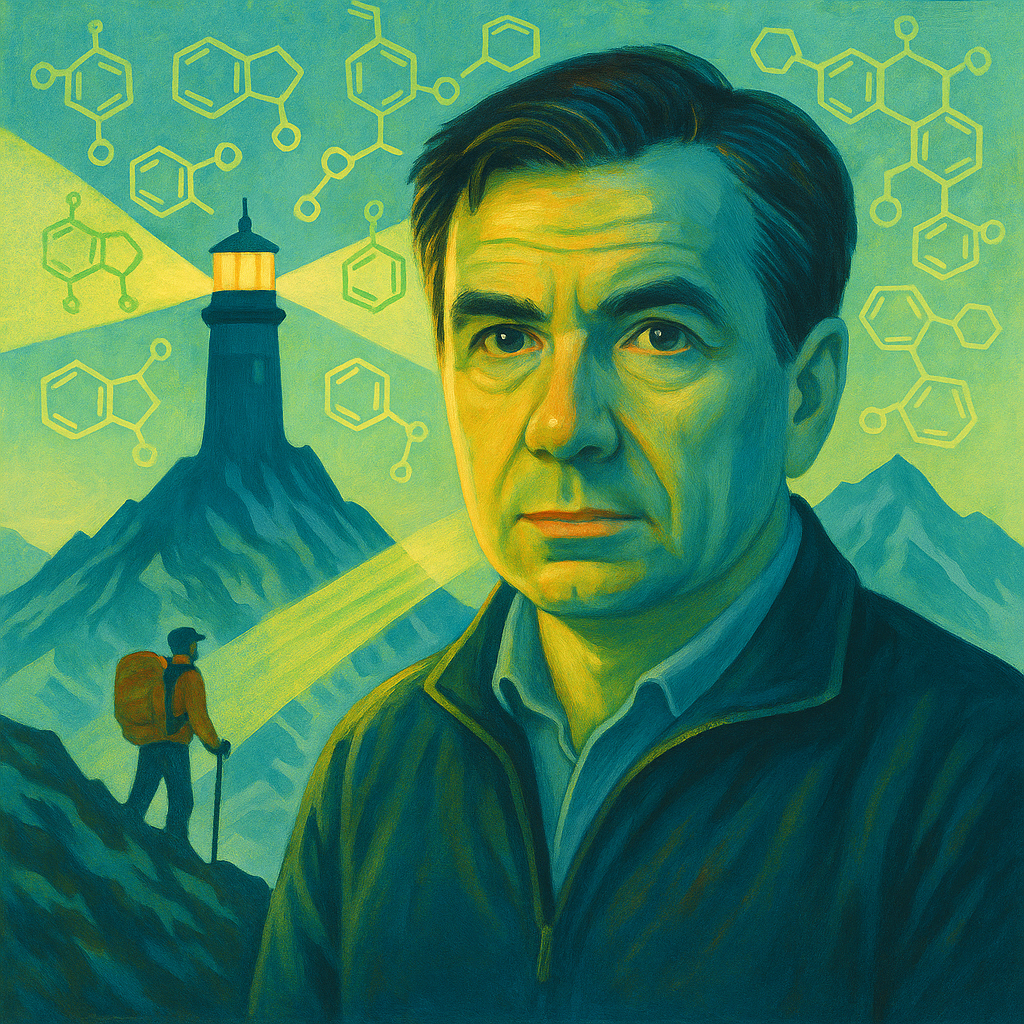From the Summit to the Subatomic: How Mountain Climbing Shaped a Quantum Founder
A conversation with Martin Martinov, Founder of FAR Biotech

At first glance, scaling Himalayan peaks and quantum modeling of biomolecular interactions might seem worlds apart. But as we see it, these two pursuits of Dr Martin Martinov—Founder of FAR Biotech—are deeply intertwined.
Martin is known in scientific circles for his pioneering work at the intersection of quantum mechanics, machine learning, and drug discovery. He’s spent decades developing methodologies and algorithms that reimagine how we strive to treat and cure disease, with the backing of the Gates Foundation, the NIH, and leading academic institutions. To his team, Martin is more than a scientist—he's a problem solver that brings the same calm intensity and clear thinking to his research as he does to a technical climb.
During early conversations shaping FAR Biotech’s identity, one thing became clear: Martin doesn’t just think differently—he moves differently. Whether he’s navigating avalanche terrain or rethinking small-molecule drug discovery, he’s drawn to challenges that are high risk and high reward. He operates with conviction, but also with humility, knowing that meaningful objectives—like a successful ascent—depends on both preparation and adaptability.
In this conversation, Martin reflects on the mental discipline that mountaineering demands, why climbing serves as a kind of active meditation, and how those experiences have shaped his leadership style and scientific vision. It’s a rare look at the person behind the platform—one who’s driven not by ego or accolades, but by curiosity, and theoretically rigorous approaches to impactful problems.
Before we dive into quantum and biotech—can you tell us how you became interested in mountaineering?

MM: It’s been a gradual process—I grew up around mountains, so climbing has always been part of my life. However, one experience that stands out, was in high school, when we were backcountry skiing in the snowy mountains of Bulgaria. We were having so much fun that we didn’t pay enough attention to the route, ended up in avalanche terrain, and had to make some difficult choices to get out safely. That experience stayed with me because it taught me how small decisions can have significant consequences.
How has mountaineering influenced how you think—or how you lead?
MM: To me, climbing is problem solving. You’re faced with a challenge, and you have to get in the zone to find a way through it. That’s when I feel most focused. Being on the sharp end of a rope, when you’re leading, forces you to be fully present. That’s a skill I’ve carried into my work—staying in that zone of intense focus when it really matters. Also, a lot of the outdoor activities I enjoy, whether climbing, backcountry skiing, or wing foiling, serve as a kind of active meditation. I’m not consciously thinking about science in those moments. Stepping away like that helps me gain perspective by letting my mind go wherever it wants to go.
At what point did your scientific curiosity intersect with entrepreneurship? How did the idea for FAR Biotech emerge—and how did your background prepare you to build something so ambitious?
MM: I’ve always been interested in drug discovery and human health—there’s just so much unmet need, especially in neglected and tropical diseases. I felt strongly that we weren’t doing enough. Academic research has its place, and I respect the advances that have come out of it. But I also believe startups can move faster, pivot more easily, and focus on practical outcomes over incremental progress. Ultimately, I wanted to be in an environment where I could do impactful work—and for me, that meant building FAR Biotech.
Both climbing and quantum drug discovery involve immense patience and precision. How do you decide when to push forward and when to wait?
MM: It really depends on the situation. Often, when I run out of energy or perspective, I step back and regroup. And for me, that usually means getting outside and going into the mountains, where I can reset.
Do you see any parallels between navigating a route on a mountain and building a QuantumAI platform for pharma?
MM: Absolutely. I like climbing analogies a lot. When you're climbing, you're often faced with a limited set of decisions—but those decisions can be incredibly high-stakes and sequential. One move impacts the next. In drug discovery, especially when you’re applying Quantum Mechanics, it can be similar. You have to reduce complexity down to a yes-or-no decision: do we test this hypothesis, or that one? It’s about focus and clarity.
You’re building something radically different from the status quo. What’s been your guiding principle through the ups and downs?
MM: I believe even very pragmatic problems—like those in biology—need to be approached with a kind of axiomatic clarity. For me, that means building everything on a foundation of data and rigorous hypothesis testing. That’s non-negotiable.
What have you learned while building FAR Biotech?
MM: That this is absolutely a team effort. Success depends on the group—on having people who can operate across both the research and the business sides, and who can communicate well. The team has to be diverse, but with enough overlap to delegate and collaborate effectively. That’s where the magic happens.
What do you hope people understand about the future of Quantum Mechanics in drug discovery that’s often misunderstood today?
MM: Quantum Mechanics is, at least currently, the best physical theory we have to describe biomolecular interactions. To me, that makes it the most suitable foundation for drug discovery.

And finally—do you have another climb in mind, literally or metaphorically?
MM: Honestly, I try not to focus too much on fixed objectives—whether in climbing, research, or business. What matters more to me is the process of problem solving, as well as the people I get to work with. In climbing, the team often needs to adapt and re-evaluate its objectives. That shared experience of critically analyzing a challenging situation and determining the best plan of action is far more rewarding than chasing a summit alone. I think the same applies to scientific research and novel technologies.
We’ll be sharing more conversations like this with the people behind FAR Biotech’s science. If you’d like to follow along as we explore the peaks and valleys of innovation, connect with us on LinkedIn.




